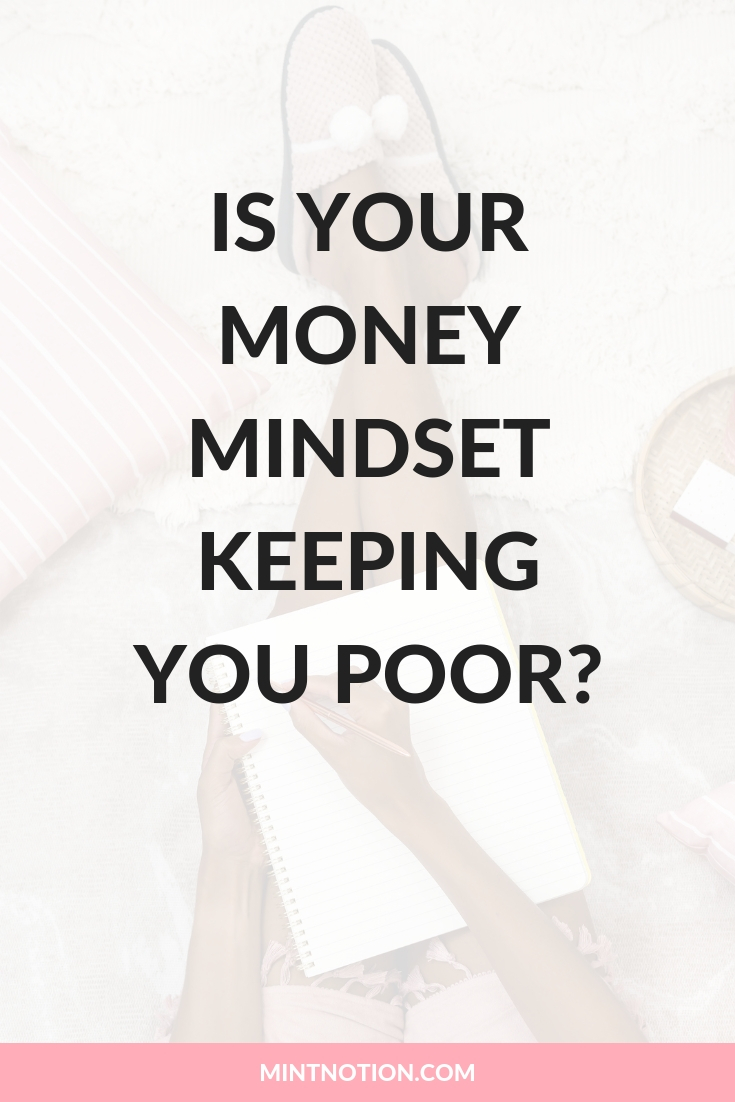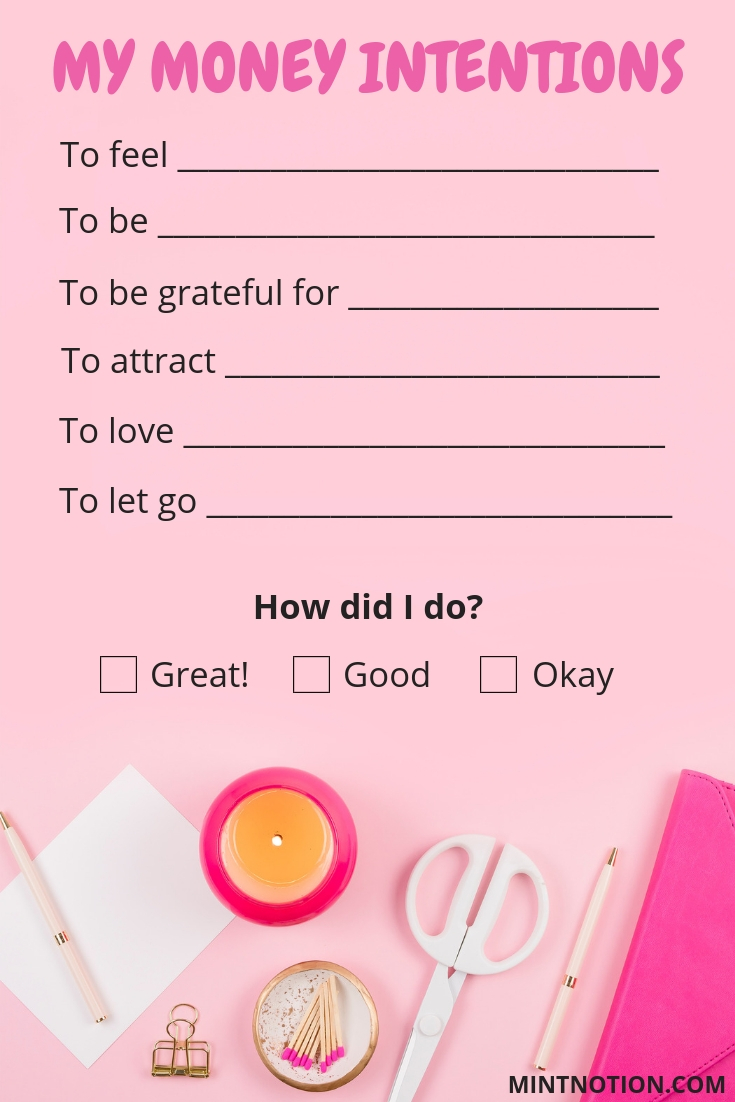Today I’ll show you how to develop an abundance money mindset. But first, let me ask you — What comes to mind when you think about money?
Do you feel stressed or anxious?
Do you feel like you have little control over your finances?
Are you thinking about those credit cards you’ve been struggling to pay off?
Do you feel empowered?
Our environment can influence the way we think and feel about money. Worrying about money can be exhausting. This can leave us with less energy and time to do the things we enjoy.
The way you think about money can prevent you from building wealth or attaining your goals. You may find you’re afraid to spend money or you’re spending most of it the moment you get paid. Your money mindset might be preventing you from reaching your true potential.
Related Posts:
- 2020 Budget Binder Printables package
- How to create a budget for beginners
- 5 ways to build a healthy relationship with money (if you want to be rich)

Table of Contents
Story #1 – People who want to make more money are greedy
Recently, I was talking to a friend of mine who is looking for a new job. This friend of mine got a job interview, but she was afraid to ask for more pay compensation than she was currently making.
Even though her goal is to make enough money to get her own apartment, her money mindset was negatively impacting her relationship with money. Her mindset is blocking her from being able to reach her goal.
When I asked her why she felt uncomfortable asking for more pay compensation, she replied:
“Money isn’t everything and I don’t want to sound greedy”.
In her mind, it felt wrong to ask for the pay compensation she deserved. Even though she knew that she needed to make more money to reach her goal, her money blocks prevented her from getting ahead.
After talking with her, she did end up asking for a fair pay compensation. However, it turned out the job offered a lower salary than what my friend was currently making. She declined the job and continued her search.
Now she understands that asking for a decent pay compensation is not greedy. It’ll help her reach her financial goals faster.
Story #2 – Money is a tool
One of my friends conducted a round of interviews for a job opening at their office. The company interviewed three qualified candidates for the job. The salary compensation for the job was approximately $80,000 per year, however this was not stated on the job posting.
The interviewer then asked each candidate what their salary expectations were.
The first person said $70,0000 per year.
The second person said $75,000 per year.
The third person asked for $110,000 per year.
Guess who got the job? The third person was offered the job and a $110,000 annual salary.
What’s even more interesting is the first and second candidates were women. The third candidate (who received the job offer) was a man. He recently bought a home and has a newborn baby. He was looking for a job that provided the pay compensation he needed to provide for his family.
This job candidate had an abundance money mindset. He viewed money as a tool that could help him achieve his goal. So ladies, don’t be afraid to ask for the pay compensation you deserve!
Story #3 – Money can’t buy me happiness
A few of my friends think building wealth is not important because money doesn’t buy you happiness. Instead of taking steps to secure their financial future and save money for retirement, they just focus on living for today.
They believe that getting by in life is “good enough” because that’s what they think they deserve. Their family was never good with money, so they believe their finances are out of their control. This is a scarcity money mindset.
It’s true that money can’t buy you happiness. BUT…money can give you the freedom to do things which improve the quality of your life. More money can mean you have more options in every aspect of your life. More money can help you create the life you’ve always wanted.
What you believe about money will determine your results around money. A belief is just a thought you keep telling yourself over and over again. This believe doesn’t have to be true. You CAN change your beliefs about money and your money mindset.

All three of these stories are true. Stories #1 and #3 show how money beliefs can hold you back. Story #2 shows how money beliefs can help you get ahead.
Can you relate to any of these money beliefs?
Setting Money Intentions
Many people set goals to help them get ahead financially. Whether it’s to pay off debt, save for a home, or build an emergency fund, there are many reasons why people want to improve their money situation.
Setting a goal is great. It can help us understand what we want, create a plan, and stay on track to achieve our goal. But sometimes setting goals can cause us to focus on what we don’t have. And if we fail to reach our goals, it could make us feel like a failure.
If you’re serious about changing your life, I recommend setting intentions. When you set intentions, this lets you focus on who you are in the moment. Daily intentions can help you recognize and live your values. They give you a roadmap of how to live each day so you can be happier and achieve success.
When you clearly state how you intend to feel today (instead of wishing to feel a certain way) you’re putting the power of change in your hands.
Here’s an example: Ask yourself how much money you’d like to earn next month.
Choose an amount that’s challenging, but realistic enough for you to earn next month. This means you don’t want to choose a figure that’s the same amount you’re already earning or an unrealistic figure.
Then ask yourself the following questions:
- What do I need to do in order to earn this figure next month?
- What changes do I need to make?
- What is holding me back?
- Do I need to change my beliefs or attitude?
Maybe you need to work more paid hours next month or get a second job. Maybe you need to get a side hustle or start your own business. Either way, if you want your money intentions to come true, you need to take action.
If you’re having trouble taking action, maybe you need to figure out a new course of action. If you think the course of action you’ve chosen is the right path, then maybe you need to resolve what’s stopping you.
Today’s Action Step
Grab a notebook and write down your money intentions for the coming week.
Use the following writing prompts to help you set your weekly money intentions. You can also use these prompts to create daily intentions – it’s up to you!
At the end of the week, reflect on how you did. Be honest with yourself. Did you do great? Good? Or just okay?
What can you do to live your money intentions next week?
Here are some examples of money intentions:
I intend to feel in control of my financial situation.
I intend to be more mindful of my spending habits.
I intend to be grateful for being able to feed my family healthy meals.
I intend to attract more money every day.
I intend to love myself and believe I’m worthy of living my best life.
I intend to let go of guilty feelings I have towards making more money.
You can get a copy of my Weekly Intentions worksheet in my Budget Binder Printables package here.


